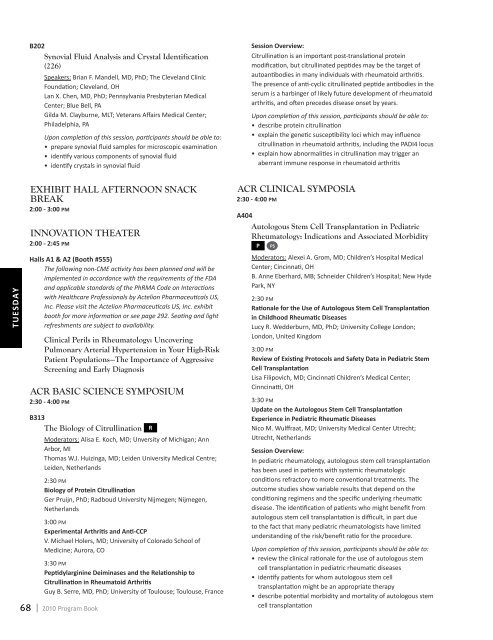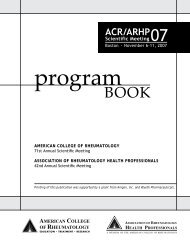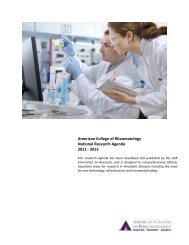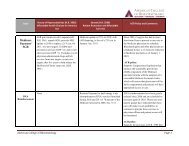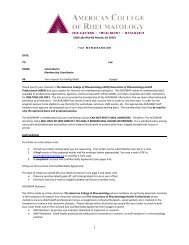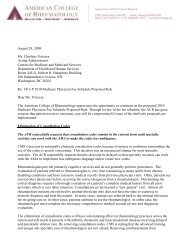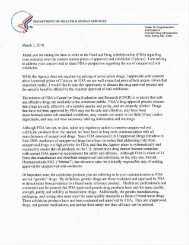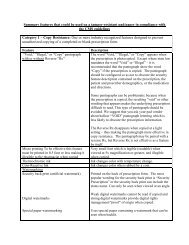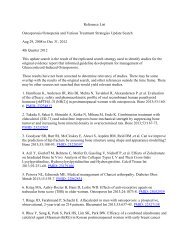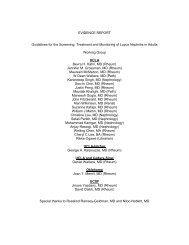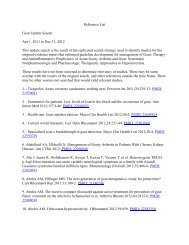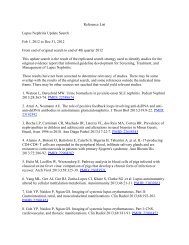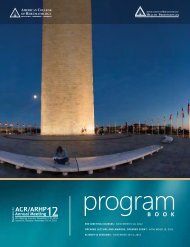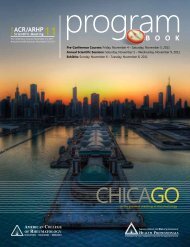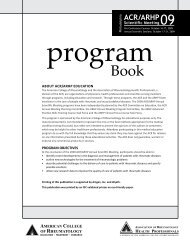B O O K - American College of Rheumatology
B O O K - American College of Rheumatology
B O O K - American College of Rheumatology
You also want an ePaper? Increase the reach of your titles
YUMPU automatically turns print PDFs into web optimized ePapers that Google loves.
B202<br />
Synovial Fluid Analysis and Crystal Identification<br />
(226)<br />
Speakers: Brian F. Mandell, MD, PhD; The Cleveland Clinic<br />
Foundation; Cleveland, OH<br />
Lan X. Chen, MD, PhD; Pennsylvania Presbyterian Medical<br />
Center; Blue Bell, PA<br />
Gilda M. Clayburne, MLT; Veterans Affairs Medical Center;<br />
Philadelphia, PA<br />
Upon completion <strong>of</strong> this session, participants should be able to:<br />
• prepare synovial fluid samples for microscopic examination<br />
• identify various components <strong>of</strong> synovial fluid<br />
• identify crystals in synovial fluid<br />
Session Overview:<br />
Citrullination is an important post-translational protein<br />
modification, but citrullinated peptides may be the target <strong>of</strong><br />
autoantibodies in many individuals with rheumatoid arthritis.<br />
The presence <strong>of</strong> anti-cyclic citrullinated peptide antibodies in the<br />
serum is a harbinger <strong>of</strong> likely future development <strong>of</strong> rheumatoid<br />
arthritis, and <strong>of</strong>ten precedes disease onset by years.<br />
Upon completion <strong>of</strong> this session, participants should be able to:<br />
• describe protein citrullination<br />
• explain the genetic susceptibility loci which may influence<br />
citrullination in rheumatoid arthritis, including the PADI4 locus<br />
• explain how abnormalities in citrullination may trigger an<br />
aberrant immune response in rheumatoid arthritis<br />
tuesday<br />
68<br />
Exhibit Hall Afternoon SnACk<br />
Break<br />
2:00 - 3:00 PM<br />
InnoVAtion Theater<br />
2:00 - 2:45 PM<br />
Halls A1 & A2 (Booth #555)<br />
The following non-CME activity has been planned and will be<br />
implemented in accordance with the requirements <strong>of</strong> the FDA<br />
and applicable standards <strong>of</strong> the PhRMA Code on Interactions<br />
with Healthcare Pr<strong>of</strong>essionals by Actelion Pharmaceuticals US,<br />
Inc. Please visit the Actelion Pharmaceuticals US, Inc. exhibit<br />
booth for more information or see page 292. Seating and light<br />
refreshments are subject to availability.<br />
Clinical Perils in <strong>Rheumatology</strong>: Uncovering<br />
Pulmonary Arterial Hypertension in Your High-Risk<br />
Patient Populations—The Importance <strong>of</strong> Aggressive<br />
Screening and Early Diagnosis<br />
ACR Basic Science Symposium<br />
2:30 - 4:00 PM<br />
B313<br />
The Biology <strong>of</strong> Citrullination R<br />
Moderators: Alisa E. Koch, MD; Unversity <strong>of</strong> Michigan; Ann<br />
Arbor, MI<br />
Thomas W.J. Huizinga, MD; Leiden University Medical Centre;<br />
Leiden, Netherlands<br />
2:30 PM<br />
Biology <strong>of</strong> Protein Citrullination<br />
Ger Pruijn, PhD; Radboud University Nijmegen; Nijmegen,<br />
Netherlands<br />
3:00 PM<br />
Experimental Arthritis and Anti-CCP<br />
V. Michael Holers, MD; University <strong>of</strong> Colorado School <strong>of</strong><br />
Medicine; Aurora, CO<br />
3:30 PM<br />
Peptidylarginine Deiminases and the Relationship to<br />
Citrullination in Rheumatoid Arthritis<br />
Guy B. Serre, MD, PhD; University <strong>of</strong> Toulouse; Toulouse, France<br />
2010 Program Book<br />
ACR Clinical Symposia<br />
2:30 - 4:00 PM<br />
A404<br />
Autologous Stem Cell Transplantation in Pediatric<br />
<strong>Rheumatology</strong>: Indications and Associated Morbidity<br />
P PS<br />
Moderators: Alexei A. Grom, MD; Children’s Hospital Medical<br />
Center; Cincinnati, OH<br />
B. Anne Eberhard, MB; Schneider Children’s Hospital; New Hyde<br />
Park, NY<br />
2:30 PM<br />
Rationale for the Use <strong>of</strong> Autologous Stem Cell Transplantation<br />
in Childhood Rheumatic Diseases<br />
Lucy R. Wedderburn, MD, PhD; University <strong>College</strong> London;<br />
London, United Kingdom<br />
3:00 PM<br />
Review <strong>of</strong> Existing Protocols and Safety Data in Pediatric Stem<br />
Cell Transplantation<br />
Lisa Filipovich, MD; Cincinnati Children’s Medical Center;<br />
Cinncinatti, OH<br />
3:30 PM<br />
Update on the Autologous Stem Cell Transplantation<br />
Experience in Pediatric Rheumatic Diseases<br />
Nico M. Wulffraat, MD; University Medical Center Utrecht;<br />
Utrecht, Netherlands<br />
Session Overview:<br />
In pediatric rheumatology, autologous stem cell transplantation<br />
has been used in patients with systemic rheumatologic<br />
conditions refractory to more conventional treatments. The<br />
outcome studies show variable results that depend on the<br />
conditioning regimens and the specific underlying rheumatic<br />
disease. The identification <strong>of</strong> patients who might benefit from<br />
autologous stem cell transplantation is difficult, in part due<br />
to the fact that many pediatric rheumatologists have limited<br />
understanding <strong>of</strong> the risk/benefit ratio for the procedure.<br />
Upon completion <strong>of</strong> this session, participants should be able to:<br />
• review the clinical rationale for the use <strong>of</strong> autologous stem<br />
cell transplantation in pediatric rheumatic diseases<br />
• identify patients for whom autologous stem cell<br />
transplantation might be an appropriate therapy<br />
• describe potential morbidity and mortality <strong>of</strong> autologous stem<br />
cell transplantation


